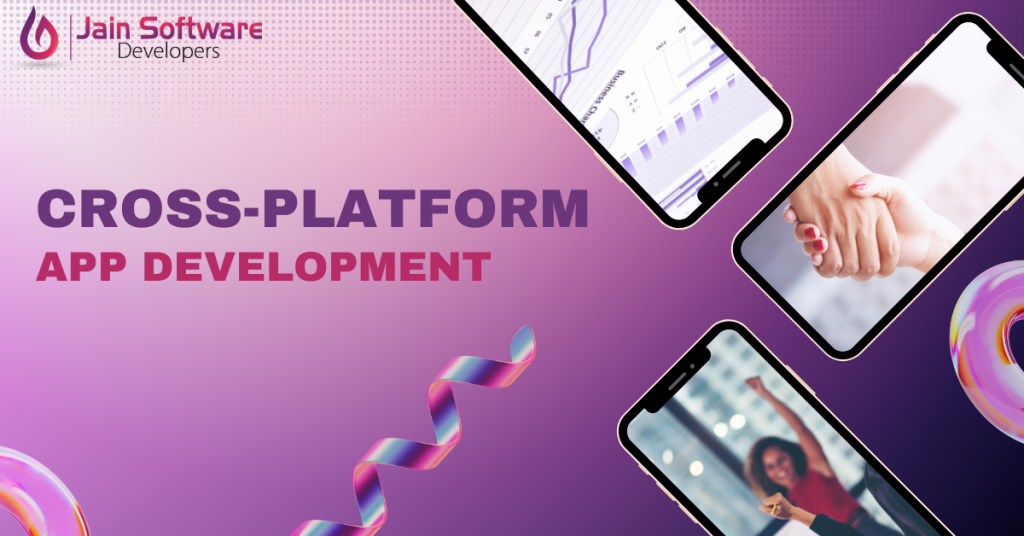What is Cross-Platform App Development?

With the ability to meet a variety of demands and improve user experiences, mobile apps have firmly established themselves in our daily lives. It can be challenging and resource-intensive to create apps for several platforms. Here comes Cross-platform app development, it is a game-changing method that enables organizations to create applications that work flawlessly across multiple operating systems and platforms. This blog article will go into greater detail on cross-platform app development, outlining its key benefits and illuminating how it is changing the software development industry.
Cross-Platform App Development: An Overview
A single codebase is used to create mobile applications that can run on several operating systems, such as iOS and Android, in a process known as cross-platform app development. It saves time, effort, and money by doing away with the need to create distinct apps for each platform.
Advantages of Cross-Platform App Development
Cost and time saving:
By building code once and deploying it across various platforms, cross-platform app development enables organizations to make the most of their resources. As a result, there will be no need to create unique native apps for each operating system, saving money and speeding up development. Businesses can shorten their time to market without sacrificing quality by using cross-platform frameworks and tools.
User Experience Consistency:
Maintaining a high level of user engagement and brand loyalty is essential. Developers can maintain a unified UI/UX across a variety of platforms thanks to cross-platform development tools. No matter what device or platform the user chooses, they will experience a familiar appearance and feel. This uniformity improves usability, lessens user uncertainty, and reinforces brand identity.
Greater Market Coverage:
By concurrently focusing on various platforms, cross-platform app development enables firms to reach a larger audience. Businesses may maximize their market reach and prospective consumer base by utilizing a single codebase to access the user bases of iOS, Android, and other platforms. This greater visibility may result in more user recruitment and income prospects.
Streamlined Updates and Maintenance:
Keeping apps updated and maintained across several platforms can be challenging. However, this procedure is made simpler by cross-platform software development. Businesses can push out updates and bug fixes to all platforms concurrently with a unified codebase, assuring a standardised user experience and lowering maintenance costs. By using a streamlined process, companies can update their apps on schedule and save time.
Selecting the Best Tools for Cross-Platform Development:
Businesses need to use the appropriate tools and frameworks in order to fully realise the benefits of cross-platform app development. React Native, Flutter, Xamarin, and PhoneGap are just a few of the well-known choices. Each framework offers distinct features and capabilities, enabling organisations to select the one that best suits their needs, the capabilities of their development team, and their long-term objectives.
Conclusion:
Cross-platform app development has completely changed how companies produce mobile applications. Cross-platform development has changed the game for software developers thanks to its advantages in cost savings, time efficiency, consistent user experience, and wider market reach. Through the use of cross-platform frameworks and technologies, organizations may speed up the development process, access a larger market, and offer a consistent user experience across several platforms. As the demand for mobile apps rises, businesses that want to remain competitive and offer cutting-edge solutions in the quick-paced digital world must embrace cross-platform app development.
Frequently asked questions
Q: What distinguishes cross-platform app development from hybrid app development?
A: The technology programmers choose to implement each development strategy are the primary distinction between hybrid and cross-platform app development. By definition, hybrid app development makes use of both native and web technologies.
Q: Is a consistent user experience possible with cross-platform apps?
A: Yes, cross-platform development frameworks let companies keep the same user experience across several platforms. whichever of the device or platform they use, users will appreciate a familiar interface, increasing brand consistency and customer satisfaction.
Q: How does the quality of cross-platform apps differ?
A: The quality of apps is not fundamentally compromised by cross-platform development. High-quality apps can be created utilising cross-platform frameworks for a variety of platforms with the use of suitable development techniques, attention to platform-specific requirements, and extensive testing.

